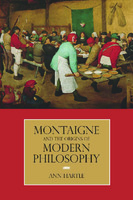Montaigne and the Origins of Modern Philosophy
Author(s)
Hartle, Ann
Collection
Knowledge Unlatched (KU)Number
101383Language
EnglishAbstract
Montaigne’s Essays are rightfully studied as giving birth to the literary form of that name. Ann Hartle’s Montaigne and the Origins of Modern Philosophy argues that the essay is actually the perfect expression of Montaigne as what he called "a new figure: an unpremeditated and accidental philosopher." Unpremeditated philosophy is philosophy made sociable—brought down from the heavens to the street, where it might be engaged in by a wider audience. In the same philosophical act, Montaigne both transforms philosophy and invents "society," a distinctly modern form of association. Through this transformation, a new, modern character emerges: the individual, who is neither master nor slave and who possesses the new virtues of integrity and generosity. In Montaigne’s radically new philosophical project, Hartle finds intimations of both modern epistemology and modern political philosophy.
Keywords
Philosophy; Aristotle; Epaminondas; Michel de MontaigneDOI
10.2307/j.ctv3znz85ISBN
9780810129658Publisher
Northwestern University PressPublisher website
https://nupress.northwestern.edu/Publication date and place
Evanston, Illinois, 2013-11-30Classification
Philosophy: epistemology and theory of knowledge


 Download
Download